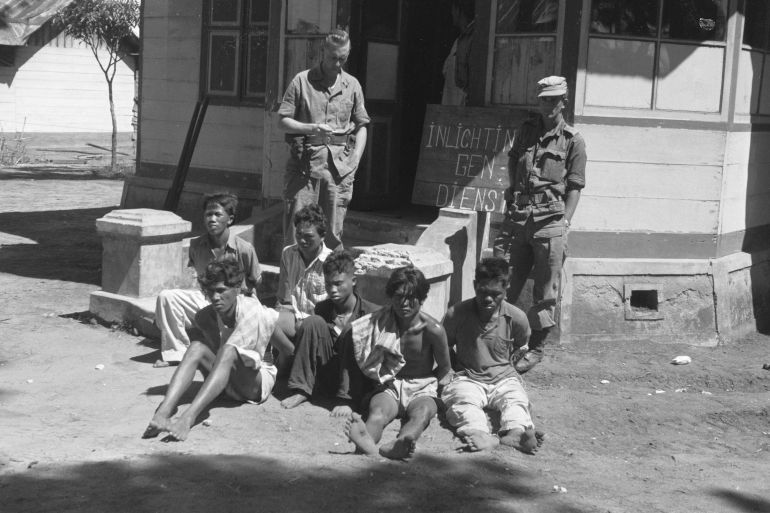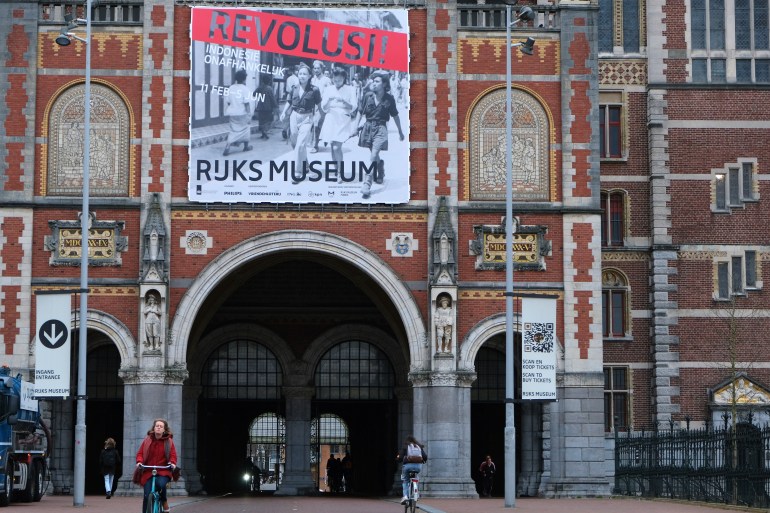Indonesia: Dutch sorry for independence war ‘extreme violence’
Prime Minister Mark Rutte apologises after study by Dutch and Indonesian researchers shatters long-held belief that there were only isolated cases of violence.

The Netherlands’ Prime Minister Mark Rutte has apologised to Indonesia after a study found the Dutch army used “systematic and extreme violence” in a vain attempt to regain control of its former colony at the end of World War Two.
Dutch forces burned villages and carried out mass detentions, torture and executions during the 1945-49 conflict, often with tacit government support, concluded Dutch and Indonesian researchers following a four and a half year investigation.
Keep reading
list of 4 itemsIndonesia to buy French fighter jets, as US approves F-15 plan
Indonesia starts testing homegrown COVID vaccine on humans
After 20 years, Indonesia’s ExxonMobil accusers eye day in court
The findings shattered the long-held official Dutch line that there were only isolated incidents of excessive violence by its forces as the colony it had held for 300 years fought for its freedom.
“We have to accept the shameful facts,” Rutte said at a news conference on Thursday after the findings were published.
“I make my deep apologies to the people of Indonesia today on behalf of the Dutch government.”
The researchers had earlier presented their findings of the study, which began in 2017 and was funded by the Netherlands as part of a broader reckoning with the country’s brutal colonial past.

Violence by the Dutch military, including acts such as torture that would now be considered war crimes, was “frequent and widespread”, said historian Ben Schoenmaker of the Netherlands’ Institute for Military History, one of more than two dozen academics who participated in the study.
“The politicians responsible turned a blind eye to this violence, just as the military, civil and legal authorities. They aided it, they concealed it, and they punished it barely or not at all,” he said.
Reckoning with the past
Indonesia declared independence in 1945, shortly after the defeat of the Japanese who had occupied the country during the Second World War.
But the Dutch wanted to hang onto their former colony, and sent troops to put down the independence uprising.
About 100,000 Indonesians died as a direct result of the war, with the Netherlands withdrawing in 1949.
The Dutch crimes “included mass detentions, torture, burning of kampongs (villages), executions and killing of civilians”, said Frank van Vree, a war history professor at the University of Amsterdam, during an online presentation of the research.
Dutch courts have ruled that the Hague-based government must compensate the widows and children of Indonesian fighters executed by colonial troops, and that the statute of limitations does not apply in the case of Indonesia’s struggle for independence.
On a visit to Indonesia in March 2020, King Willem-Alexander apologised for Dutch violence.
The study noted that during the war the government and military had the support of an approving society and uncritical media, which were rooted in a “colonial mentality”.
“It is evident that at every level, the Dutch unquestioningly applied different standards to … colonial ‘subjects’,” a summary of the findings said.
A representative of the Netherlands Veterans Institute criticised the findings of the latest study saying they evoked “a feeling of discomfort and concern”.
“Veterans who served in the former Dutch East Indies are collectively placed in the suspect’s dock thanks to unsubstantiated conclusions,” the institute’s director, Paul Hoefsloot, said in a written statement.
Although the study focused on Dutch actions, it noted that Indonesian forces also used “intense” violence, and killed about 6,000 people in the opening phase of the conflict, targeting Eurasians, Moluccans, and other minority groups.
